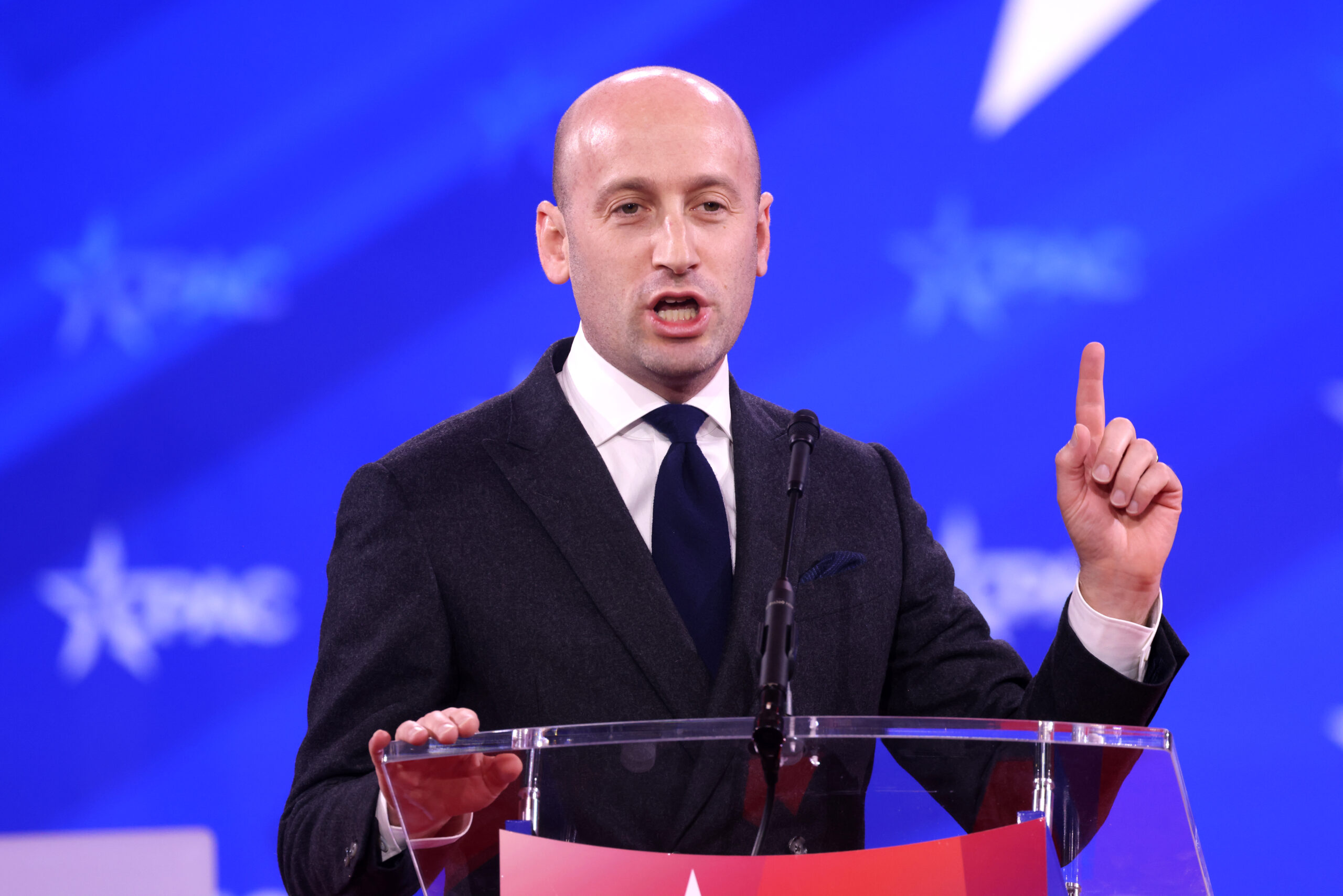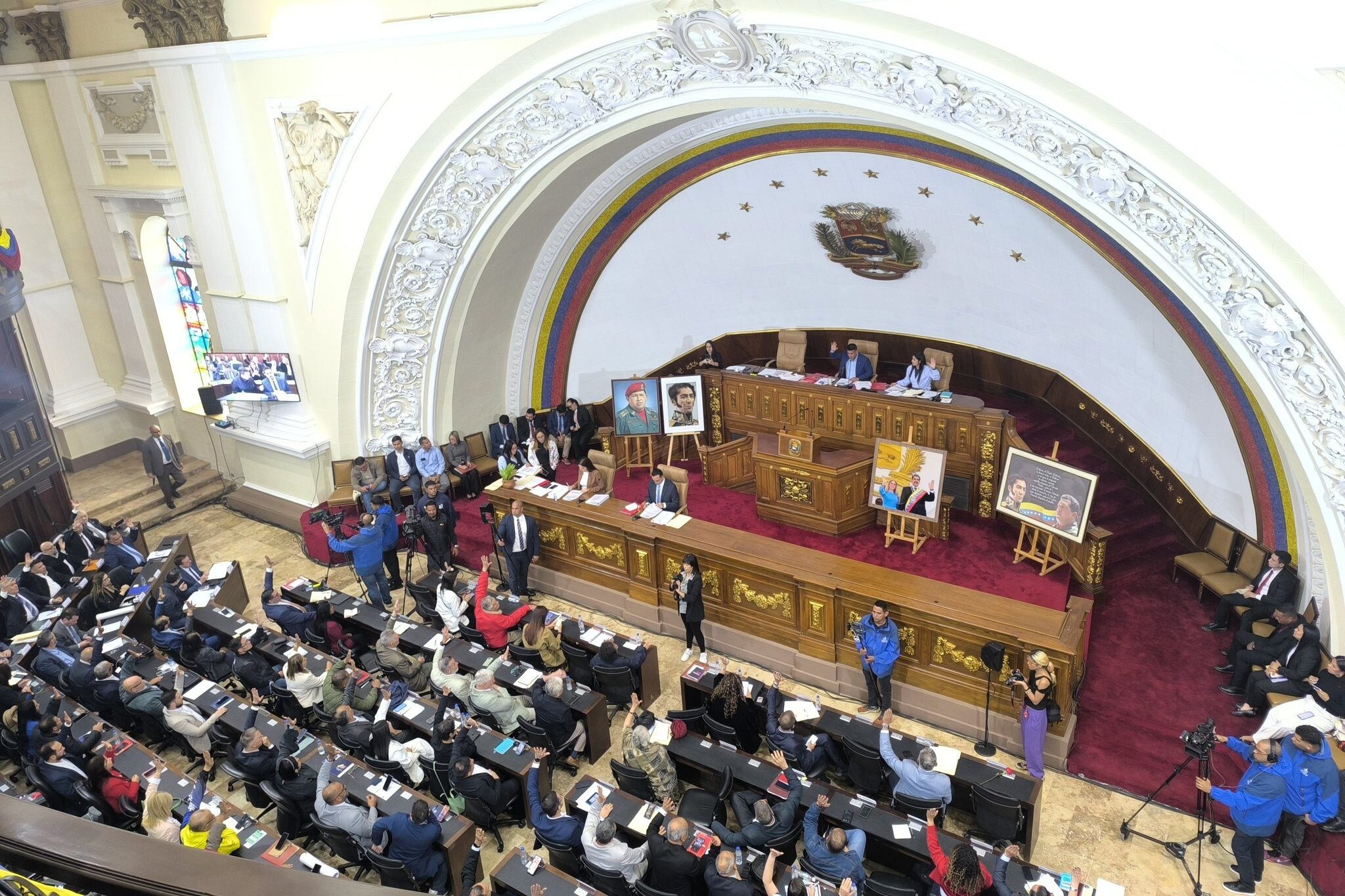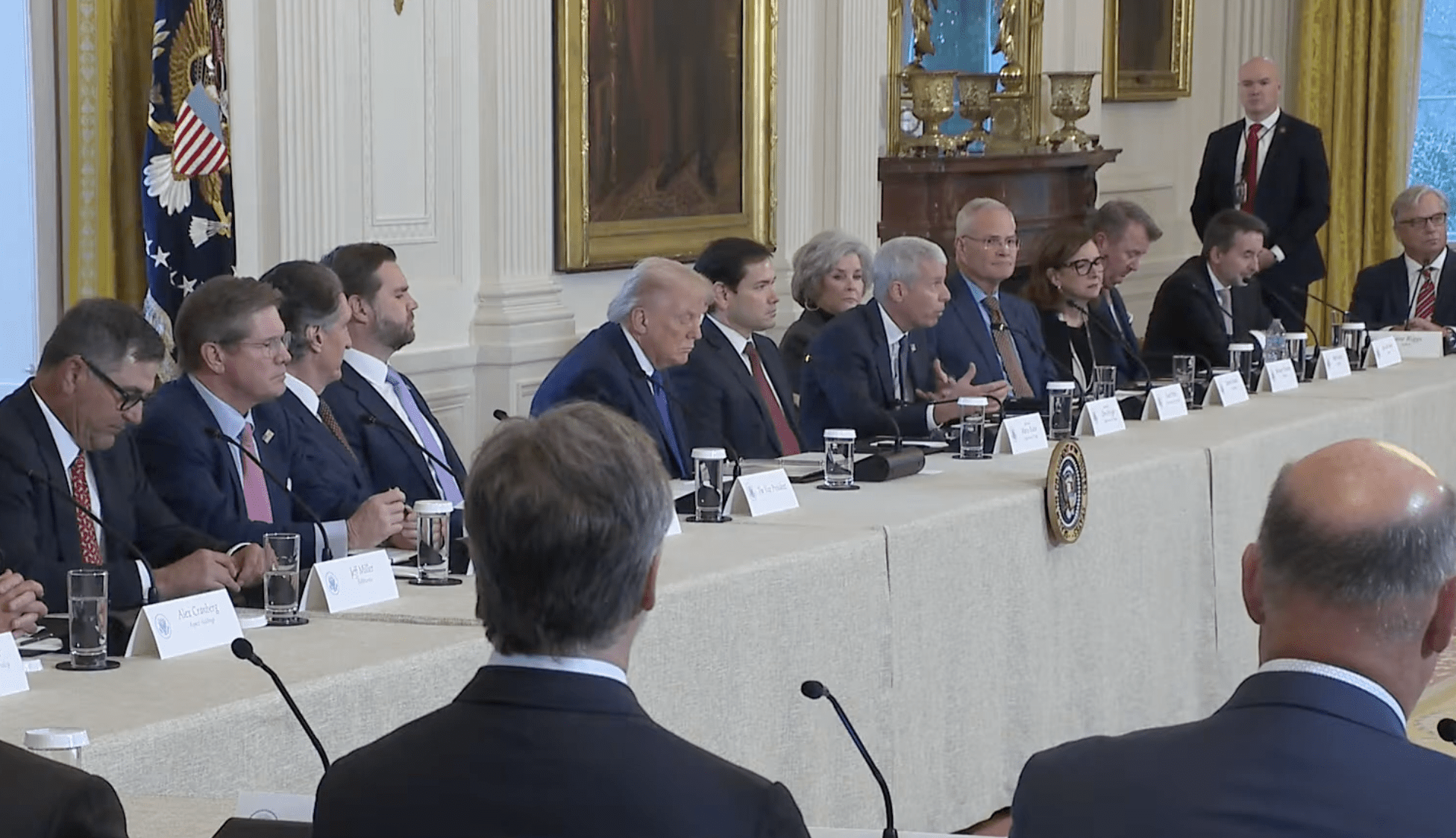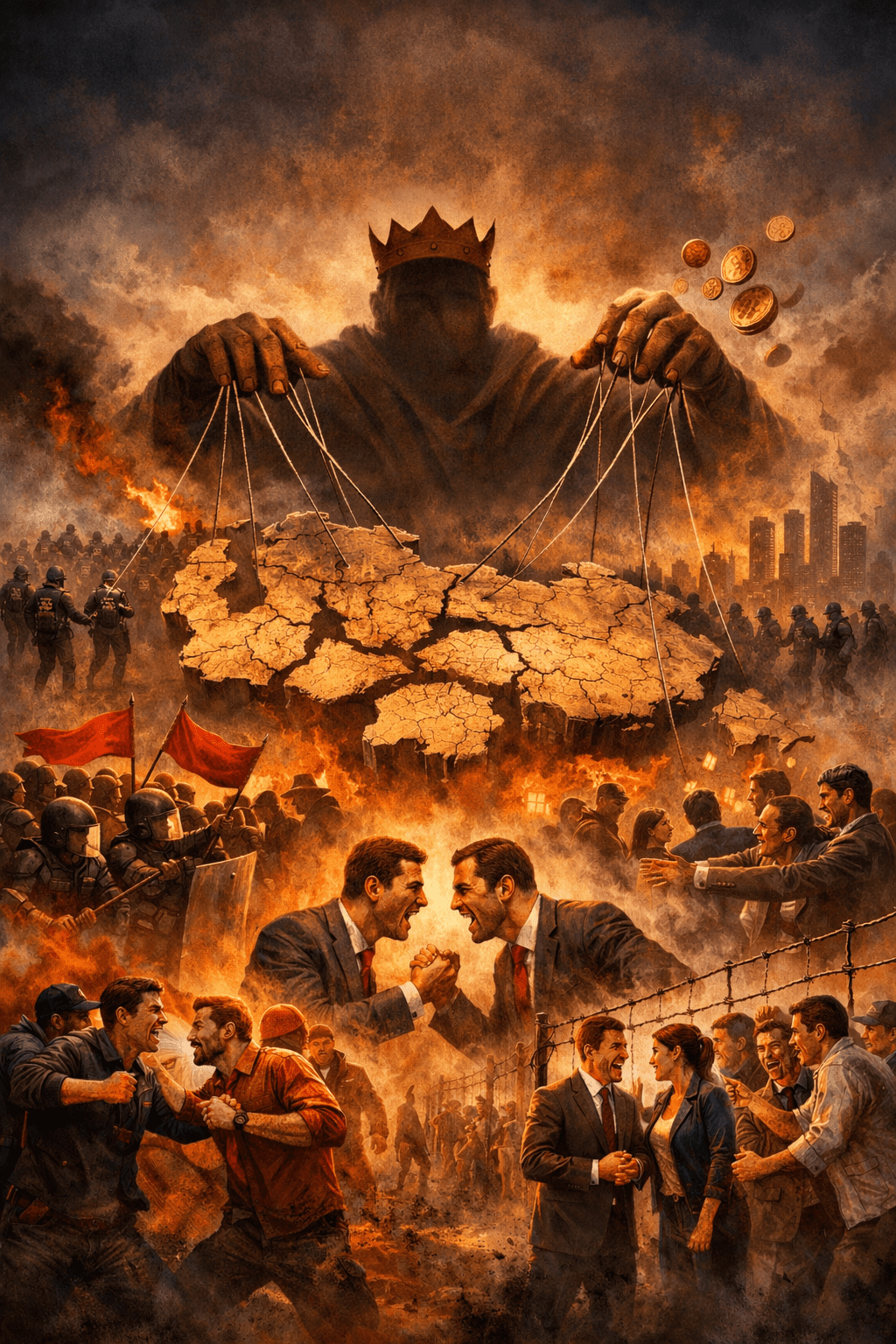Stephen Miller has been part of Donald Trump’s inner circle for several years. He is currently his Deputy Chief of Staff and advisor for domestic national security. Photograph: Gage Skidmore.
Jorge Barragán is an international analyst. He graduated from the Central University of Venezuela (UCV).
Guacamaya, October 14, 2025. Stephen Miller, perhaps President Donald Trump’s most trusted man, has emerged as the key ideological and most powerful figure within the White House in this second administration.
Every president usually has a favorite advisor, and in Trump’s case, that role is filled by Miller, who holds the positions of Deputy Chief of Staff and advisor for domestic national security policy. In fact, he is the only close advisor who also accompanied him during his first presidency. Analysts compare his influence to figures like Dick Cheney (the all-powerful vice president to George W. Bush) due to the unprecedented control he exerts over government policies.
The clearest sign of his status comes from Trump himself: asked on NBC’s Meet the Press about the possibility of naming Miller as National Security Advisor, Trump dismissed the idea, stating it would be a “demotion” because “Stephen is much higher up in the hierarchy” of his government. In other words, Miller has a direct line of authority to the president, even above other high-ranking officials.
The Ideologue Behind Trump’s Anti-Immigration Agenda
As the architect of the hardline immigration policy, Miller has shaped Trump’s most controversial and visible initiatives, both in his first term and now.
During the period out of power (2021-2024), Miller did not sit idly by: he founded the organization America First Legal to defend the “America First” agenda in the courts. From there, he analyzed how to make Trumpist policies more effective by bypassing the judicial checks and balances that frustrated many measures in the first administration. Indeed, Miller prepared to govern again alongside Trump, studying how to overcome the legal and bureaucratic obstacles that had previously held them back.
The agenda of Trump’s second government largely reflects the ideas promoted by Miller for years. Almost all the most radical immigration initiatives bear his fingerprints.
- End of Birthright Citizenship: On inauguration day in January 2025, Trump signed an executive order (conceived by Miller) to eliminate birthright citizenship (jus soli) for children of undocumented immigrants born in the U.S.
- National Emergency and Border Militarization: Miller was a promoter of declaring an “invasion” at the southern border to activate emergency powers. Under his direction, National Guard troops were deployed with the argument of combating crime linked to immigration. Cancellation of TPS (Temporary Protected Status) and the imposition of the “travel ban” or entry prohibition for several nationalities, such as the Venezuelan one.
- Detention Quotas and Mass Deportation: Following Miller’s guidelines, ICE and the Border Patrol have operated under aggressive arrest and expulsion targets. In May 2025, Miller imposed a quota of 3,000 daily immigrant detentions, leading to operations in restaurants, courts, and even hospitals to capture undocumented individuals, generating panic in migrant communities and clashes with local Democratic authorities.
- Crackdown on “Sanctuary Cities” and Democratic States: Under Miller’s tutelage, heavily armed federal forces were deployed in cities with high crime rates (Chicago, Philadelphia, etc.) with the premise of “restoring order,” a controversial tactic that Democrats labeled as militarization for political purposes.
- Designation of Cartels as Foreign Terrorists: A long-standing proposal by Miller, implemented in this administration, was to label certain international drug cartels as Foreign Terrorist Organizations (FTO). This included, in particular, the Tren de Aragua. The “terrorist” label aims to enable exceptional combat tools (including direct military actions) against these organizations, something unprecedented in traditional anti-drug policy. As detailed later, this move has profound legal implications for Miller’s immigration agenda.

Ideological Vision from an Early Age
During his time at Santa Monica High School, Stephen Miller delivered a speech that was widely discussed for its provocative tone and which foreshadowed traits of his later political perspective. In a video made for an audiovisual class during his candidacy for student government, Miller stepped up to the podium and said:
“Hi, I’m Stephen Miller. Some of you may not know me… I would say and do things that no one in their right mind would say or do. Am I the only one who is tired of being told to pick up trash when we have so many janitors who are paid to do it for us?”
Critics at the time interpreted the comment about the janitors as a classist and racist provocation, given the demographic composition of those who performed those jobs.
This episode not only shows his early taste for controversy but also how from a young age Miller articulated a narrative of “us versus them” — a moral and cultural identity that he himself would later define in opposition to immigrants, minorities, and what he considered “nationalist imperatives.”
According to the biography Hatemonger, his family experienced financial difficulties after an earthquake in the nineties, which forced the Millers to move to a more modest home when Stephen was just 13 years old. This episode, far from awakening solidarity, deepened in him an awareness of fragility and competition: it was in this context that Miller began to link economic insecurity with the threat of the “other” — especially the immigrant — as an adversary that must be combated, not understood.
Successes in Curbing Migration: Figures and Even Unexpected Praise
So far, the hardline immigration campaign designed by Miller has achieved results that Trump himself boasts of as his greatest success. According to official data from the Department of Homeland Security (DHS), in the first eight months of the government, 2 million undocumented migrants have left the United States – about 1.6 million are believed to have self-deported due to the pressure, and 400,000 were forcibly deported by the authorities.
These policies have had a tangible impact on migratory flow. For the first time in more than 50 years, the total immigrant population in the U.S. decreased instead of growing. It went from a peak of 53.3 million in January 2025 to 51.9 million in June – that is, 1.4 million fewer in a few months, according to Pew Research.
Bernie Sanders, a critic of Trump, conceded in an interview that “no one believes that illegal immigration is appropriate” and acknowledged the need for more secure borders. “We must stop illegal entry; it is not right for people to cross the border like that,” Sanders said on ABC News, endorsing Trump’s basic principle while also calling for comprehensive immigration reform.
However, the Democratic senator also warned that “If Trump deports 20 million people, he would completely destroy this country. Trump’s billionaire friends are not going to harvest our fields or work in the slaughterhouses,” Sanders stated. These comments reflect how even those who disagree with Trump recognize the real effect of his border policies while fearing their excesses.
From the Courts to the Caribbean Strategy: The Controversial Alien Enemies Act
Despite the proclaimed “achievements,” Miller’s offensive against immigration has open fronts and ongoing legal controversies. One of the most controversial is the invocation of the ancient Alien Enemies Act of 1798 to facilitate expedited deportations – an unprecedented legal move conceived by Miller that is currently being contested in the courts. This law allows the president to deport or detain foreign citizens from hostile nations “whenever there exists a declared war, or an invasion or predatory incursion by a foreign country.”
Miller justified it publicly with vehemence: “Venezuela is not a government, it is a drug trafficking cartel running a country,” he declared, directly accusing Maduro of being “the head of the cartel” and the Tren de Aragua of “controlling Venezuela.” In short, he argued that the United States faces an external enemy (a narco-state) and can therefore use war powers to defend itself, including expelling nationals of that country.
Given that there is no declared war or armed invasion, the court ruled that the government cannot shield itself behind this 1798 law to deport Venezuelans. The Trump administration has furiously appealed this decision, and Miller personally leads the legal team in the battle. The case could escalate to the Supreme Court, as the government insists that the infiltration of a narco-regime meets the definition of “predatory incursion” contemplated by the law (something most judges rejected).
Behind this complex legal tactic is again Miller’s hand, combining warlike rhetoric, military movements, and creative legal argumentation. In fact, the unusual U.S. military deployment in the Caribbean this year has much to do with this strategy. Officially, its mission is to intercept drug shipments, but in practice they have carried out extrajudicial attacks against suspicious boats linked to Venezuelan drug trafficking.
According to The Guardian, Miller has personally directed these operations against Venezuelan boats, assuming a role even above the Secretary of State and interim national security advisor, Marco Rubio. By concentrating control of these actions in his own council (HSC), Miller ensures the creation of faits accomplis that support the legal narrative that “the United States is under attack by a foreign entity.” The presence of marines and missiles in the Caribbean thus serves as a central piece of the self-defense justification under Article II of the Constitution that the White House wields for the attacks and deportations. In short, Miller is trying to prove that a state of low-intensity war exists against an enemy “narco-state,” and therefore extreme measures would be legitimate.
Miller’s influence is also evident in the key bureaucracy surrounding these policies. One example is the State Department, where Miller managed to place Christopher Landau as Undersecretary, a former ambassador now nicknamed “the visa remover” on social media X for his enthusiasm in canceling visas. Landau is a Miller ally and his mission at the State Department has been “to control the flow of foreigners entering the United States,” according to internal sources cited by The Guardian.
Miller’s Strategic Calculus: Between the Caribbean, the Courts, and the Southern Border
The U.S. military deployment in the Caribbean, officially presented as an anti-drug operation, has a much deeper legal and political background: it constitutes the key piece of Stephen Miller’s strategy to support in the courts the application of the Alien Enemies Act against Venezuelan migrants. By framing the Maduro regime as a “narco-state” leading hostile incursions against the U.S., Miller seeks to generate faits accomplis that support his thesis that a foreign aggression exists, enabling war powers. In this framework, the military movements not only respond to security logic but are also legal and narrative tools.
However, Miller faces a delicate dilemma. An eventual “phase two” of the operation, including attacks within Venezuelan territory, could provoke a new massive wave of migration towards the United States. That would risk what has so far been presented as his greatest success: the unprecedented reduction of migrant flow at the southern border. A combination of an overwhelming humanitarian crisis in Venezuela plus legal defeats in U.S. courts could translate into a devastating blow.
His ability to maneuver between courts, armed deployments, and Trump’s political narrative makes him the true “Rasputin” of this administration. But it also reveals the fragility of his gamble: any misstep, any migration crisis triggered by precipitate military actions, could transform his greatest success into his worst vulnerability.







